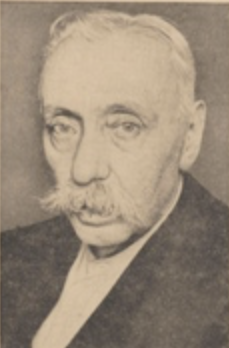Regierungsrat Dr. Richard Anton Schlesinger

Personalia
Born:
Died:
Profession:
Persecution:
Imprisoned 16.03.1938 - 05.06.1938,
driven to his death on 05.06.1938
Memberships
Curriculum Vitae
Richard Anton Schlesinger was born in Vienna, the legitimate son of the Jewish merchant Karl Samuel Schlesinger and the Catholic Sofie Franziska Arbeiter. He is the youngest of four children and is baptized Catholic. His father was impoverished by the economic crisis in 1873 and died in 1875, when Richard was five years old. After elementary school, he attended a grammar school in Vienna's 9th district, but due to the difficult financial situation, he had to give private lessons from the age of fifteen in order to support his mother and one brother financially. He finally graduated in 1879 and enrolled in law at the University of Vienna. Nothing is known about the year of his mother's death; Captain Johann Poeckh is listed as his guardian in the Nationales [note: study sheets] of the University of Vienna. In 1885, he finally obtained a doctorate in law.
In 1891, Richard Schlesinger married Louise Sofie Kotanyi, who was born in Hungary. In 1892, their son Hans Schlesinger was born. Richard Schlesinger subsequently became a court and court advocate, government councillor, member of the Tax Assessment Commission, judge at the Supreme Court and lawyer for the Teutonic Knights.
In 1909, Richard Schlesinger joined the masonic lodge "Zukunft" and later became an honorary member of the masonic lodges "Eintracht", "Kosmos", "Treue", "Humanitas", "Goethe", "Heimat", "Plato", "Zur Verschwiegenheit" (Pressburg) and "Lessing zu den drei Ringen" (Czech Republic).
With the outbreak of the First World War, his son Hans was conscripted. As the family was without news of their son for a long time, Louise Schlesinger took her own life on June 14, 1918 and did not live to see her son return from the war. After Richard Schlesinger is also suicidal, his return prevents his suicide.
On 31 May 1919, Richard Schlesinger is elected Grand Master of the Grand Lodge of Vienna [today: Grand Lodge of Austria of Ancient, Free and Accepted Masons].
The world is as if deserted, the days creep on as if with broken joints.
[To] feed hungry mouths, stem infirmity, bring salvation to enfeebled people [he appeals] to the building lodges of the neutral countries, perhaps also to some of the hitherto hostile states for help.
The convinced pacifist Richard Schlesinger opens the Grand Lodge to foreign countries and propagates the pan-European idea of Richard Count Coudenhove-Kalergi, also a Freemason.
The elimination of any national hatred, the unconcern for religious or political confession, perhaps also the little understanding for some Masonic disciplines that are more cultivated elsewhere, such as questions of regularity, the Sprengelrecht and the like, finally the complete lack of understanding for dogmatism, is probably not so developed in any fraternal chain as in the Austrian one.
As Grand Master of the Grand Lodge of Vienna, Richard Schlesinger witnessed the downfall of free and independent Austria when the German Wehrmacht invaded on March 12, 1938. As early as March 13, a special masonic detachment of the SS from Berlin began arresting leading freemasons and confiscating all lodge property.
Also on March 13, six officials appeared at the home of Richard Schlesinger, who was seriously ill and had recently undergone prostate surgery, and ordered him to hand over the grand lodge's assets. The Grand Master, who is barely able to act, delegates this to his Grand Secretary Vladimir Misar. But there is not much left to do. The owner of the rented lodge house in Dorotheergasse in Vienna's 1st district, a party member, had already opened all the doors to Gestapo officers, making a formal handover superfluous. With the occupation of Austria, German legislation was adopted and with it the 'Nuremberg Race Laws', according to which Richard Schlesinger was classified as a 'Mischling I.
On March 16, 1938, Richard Schlesinger and his son Hans Schlesinger were arrested and locked up in an overcrowded cell. The hardships, the catastrophic hygiene, the lack of medical care and the deprivation of food lead to Richard Schlesinger's total breakdown.
Thanks to the intervention of an influential Nazi lawyer and after depositing a high bail, the feverish man is transferred to a hospital, where he is isolated. Not even his family doctor is allowed to visit him. As a result, his health deteriorated noticeably. When he falls ill with pneumonia, he asks to be allowed to die at home. However, the National Socialists refused to allow him to do so.
Places
Residence:
Citations
Kodek, Günter K. (2009): Unsere Bausteine sind die Menschen. Die Mitglieder der Wiener Freimaurer-Logen 1869-1938 (Wien). S. 307/308.
Archiv Universität Wien
Patka, Marcus: Descendants of Abraham Schlesinger
Freimaurer-Wiki unter www.freimaurer-wiki.de/index.php/Richard_Schlesinger
Matricula Online
Adolph Lehmann's allgemeiner Wohnungs-Anzeiger 1938
